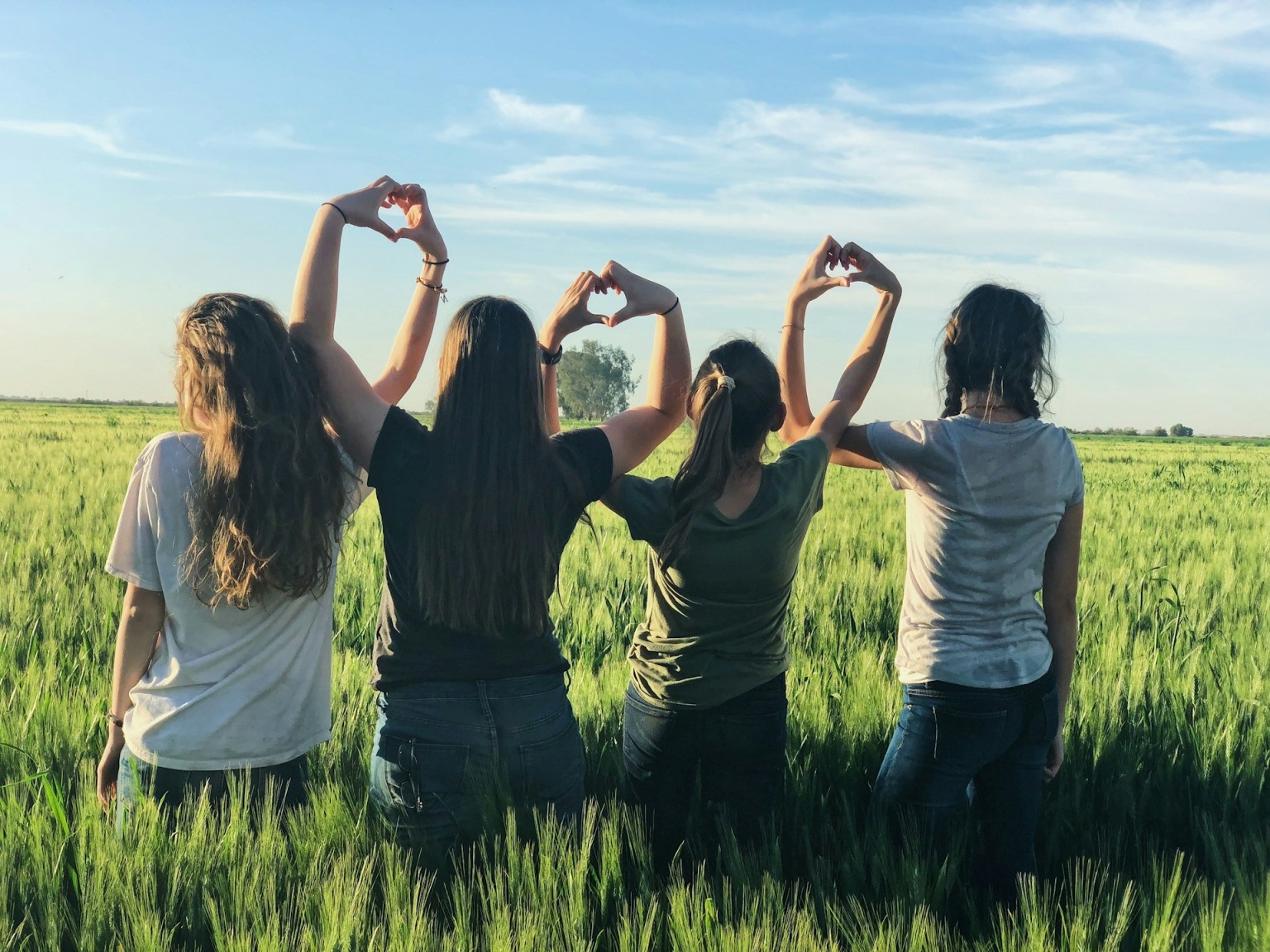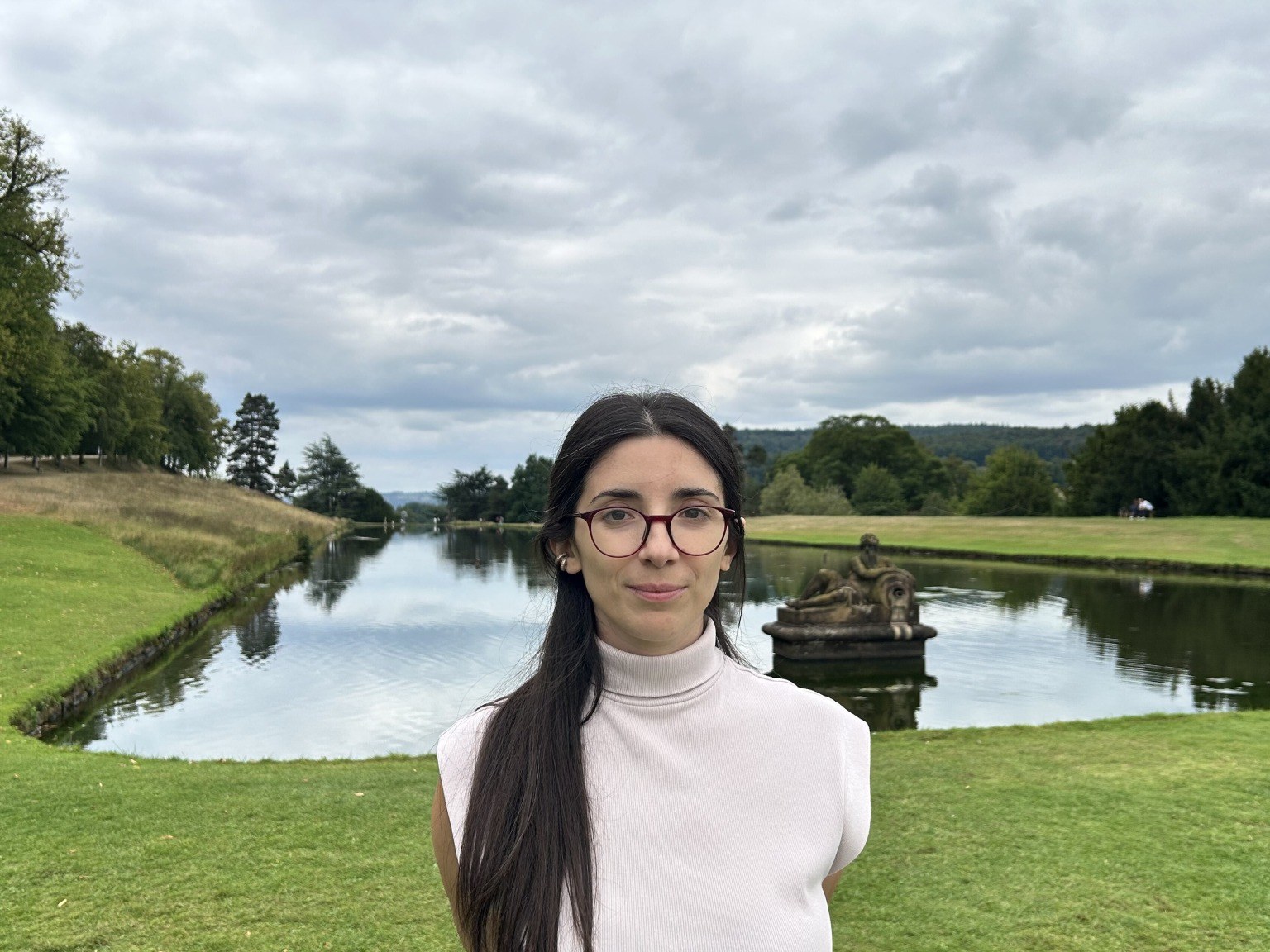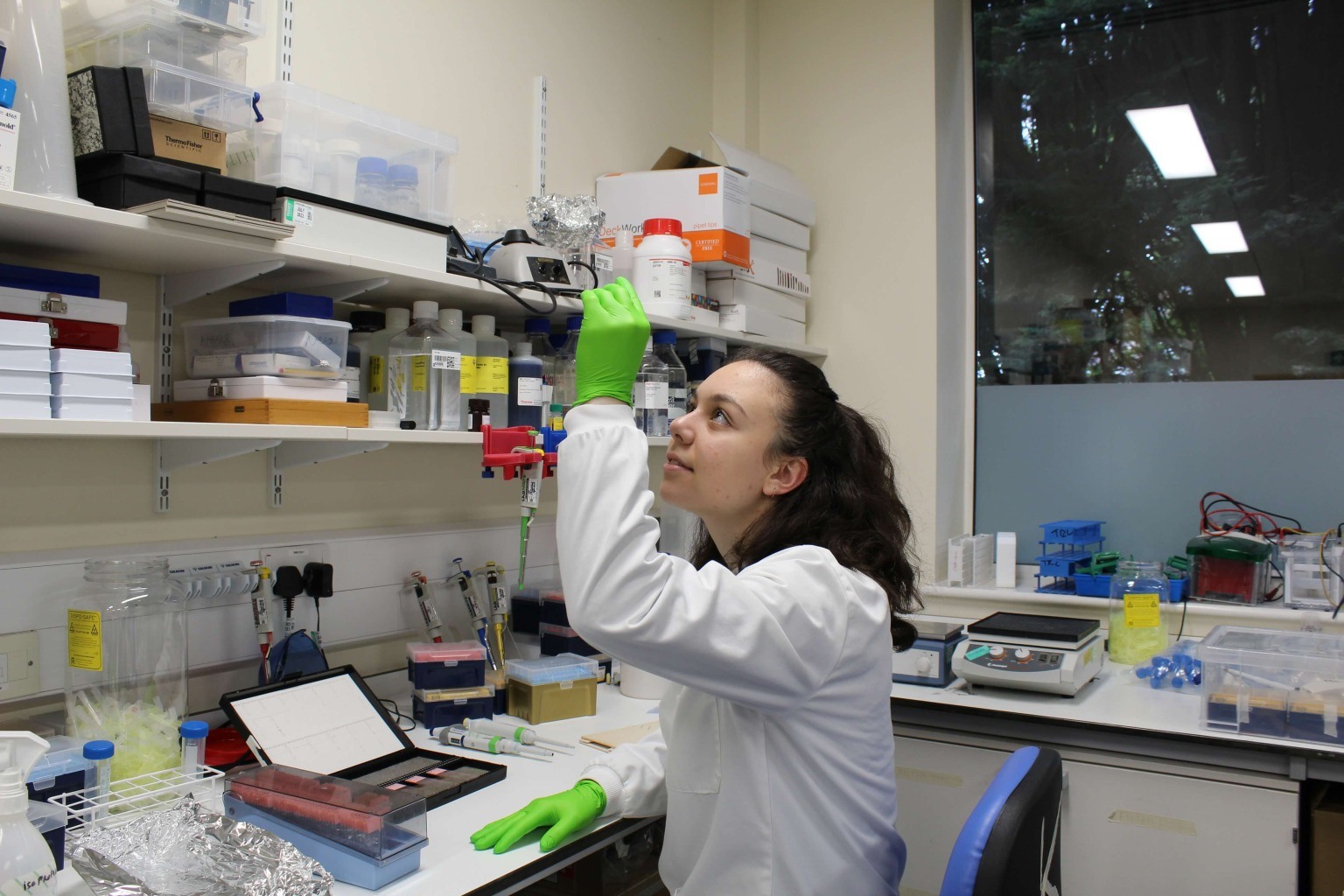
Exploring the invisible: Dr. Ariadni Boziki simulates the molecular world
Chrysovalantou Kalaitzidou

Magazine / Interviews , Science , Mentoring
In this interview, we are delighted to feature Dr. Katerina Britzolaki, one of the co-founders of Greek Women in STEM and a highly valued mentor. Originally from Crete, Greece, Dr. Britzolaki began her academic journey at the University of Crete, where she earned her B.Sc. in Biology. Early on, she realized her passion for research and embarked on a journey that took her across Europe and the United States. After completing her Ph.D. in Neuroscience at the University of Dayton, she continued her academic career as a Postdoctoral Researcher at Cornell University. It was during this time that she reached a pivotal moment in her career, leading her to make a unique shift.
Today, in addition to her contributions to Greek Women in STEM, Katerina serves as a Senior Project Manager in Healthcare and Life Sciences at PreScouter Inc., a strategy consulting firm at the intersection of scientific innovation and business development. She lives in Connecticut, USA, and enjoys traveling the world, hosting friends and family, and sharing her love for Greek cuisine and baking. With an impressive career trajectory, her story is both inspiring and insightful, and we are confident that her experiences will resonate with and motivate our readers.
Katerina, let's start with your academic background. How were you inspired to study Biomedicine and specialize in Neuroscience during your doctoral studies? Was this something you were always interested in, or did it develop later in your studies?
I always knew I wanted to study Biology, but for years, I struggled to pinpoint my specific area of focus. I had the stereotypical misconception that Neuroscience was reserved for only the most brilliant minds, and that I wasn’t "enough" for the field. Still, I was certain that Biomedicine was where I wanted to be.
My first exposure to research solidified my interest and passion for biomedical research. I knew I wanted to contribute to meaningful discoveries; ones that could shed light on human diseases and potentially lead to better therapeutics and patient outcomes. Pursuing a master’s degree in the field felt like the natural next step.
During my master's studies, I received more in-depth training, and neurobiology became a key part of my curriculum. That was when I had a pivotal realization: while I had been working in molecular biology and microbiology (areas where I felt comfortable) I wasn’t truly passionate about them. The brain’s complexity, it’s almost mystical nature, pulled me in and excited me in a way nothing else had.
I decided to set aside my fears and misconceptions and chase what truly fascinated me. That’s how I found myself pursuing a PhD in Neuroscience, focusing on behavioral neuroscience and experimental neuropsychopharmacology.
After your postdoctoral research, you decided to leave academia for a more managerial and strategic role. What led you to make this decision?
After nearly 15 years in academia and research, I found myself at a crossroad. I began questioning whether I wanted to continue on the academic path and whether the impact of my research truly extended to the broader society in the way I had hoped. While I deeply valued the role of basic research in scientific advancement, I felt a gap; the lack of direct application and translation of discoveries into tangible solutions for patients.
That was when I started exploring opportunities in the industry, searching for a space where I could drive innovation and facilitate meaningful change. Initially, I viewed my transition through a traditional lens, assuming that the ideal path would be a role in R&D at a biopharma company. But as I reflected on my journey, I realized that years of research had worn me down in some ways, and I found myself drawn more toward leadership, strategy, and management.
Then, almost serendipitously, a job posting from PreScouter landed in my inbox, recommended by a friend who had heard about the company. I still remember her words: “It sounds like they are looking for someone like you.” Initially, I hesitated; PreScouter was a strategy consulting firm, a career path I didn’t fully understand at the time. But, once again, I decided to set aside my fears and take the leap. During the interview process, it became clear that we were a great match, as my aspirations and soft skills aligned seamlessly with the company’s values and team composition. The rest, as they say, is history!
What is your current role? What are the main tasks, and what does your day-to-day routine look like?
As a Senior Project Manager in a strategy consulting firm like PreScouter, my role sits at the intersection of operational oversight and strategic development across healthcare and life sciences. Beyond managing client projects, I also mentor aspiring consultants, helping them navigate the complexities of the field.
I typically lead a variety of innovation-driven projects; clients engage with us for support in various aspects including kickstarting new R&D ventures, identifying strategic growth opportunities, expanding into new markets, among other needs. My day is a mix of project oversight, technical management, and business development, from writing proposals for new engagements to fostering relationships with both existing and potential clients. At the same time, I dedicate a significant part of my work to training and mentoring my global team, ensuring they are equipped to tackle challenges effectively.
In many ways, I’m a jack of all trades, but above all, I see myself as a catalyst for brainstorming and innovation, helping to solve complex problems and drive meaningful change in healthcare.
More than anything, my greatest aspiration is to create a lasting legacy through my mentees, empowering young women in STEM to grow into strong, successful professionals while leading fulfilling lives. I want to be a healthy example of how women can be leaders, dedicated mothers, and fulfilled individuals—all at once.
What skills did you acquire during your academic journey that were essential for your transition to your current role?
One thing I always emphasize to my mentees—or to anyone willing to listen—is that our academic journeys equip us with far more skills than we often realize. The challenge isn’t just developing these skills but recognizing and aligning them with the right career opportunities.
In my case, I was fortunate to conduct my PhD research in a young and dynamic lab environment, where I had to be resourceful, efficient, and adaptable despite limited resources. This experience honed my self-drive, attention to detail, analytical thinking, and problem-solving abilities. Additionally, my PhD fellowship was a teaching one, which meant that alongside my research, I served as an instructor throughout my studies. This experience allowed me to master the art of simplifying complex concepts, mentoring others, and guiding them toward success, ultimately shaping my mentorship philosophy.
Research, by nature, demands resilience. Anyone who has pursued an advanced degree and managed to balance it with personal well-being knows that strong organizational skills are non-negotiable. Beyond my academic experiences, I’ve always valued leadership and service. From an early age, I engaged in nonprofit work, served on committee boards, and contributed to conference organization; experiences that strengthened my leadership and strategic planning abilities, complementing my technical expertise.
I firmly believe that beyond academic achievements, soft skills are 100% transferable, and often the key differentiator in any career path.
What excites you the most about your current role?
There’s never a dull day! One moment, I might be diving deep into the scientific landscape of potential new drug targets for a debilitating disease, and the next, I am analyzing key trends in medical devices or forecasting the global impact of regulatory changes. My naturally curious nature has been a driving force throughout both my academic and corporate journey, and my current role continuously fuels that curiosity, keeping me engaged and excited about the work I do.
Beyond the intellectual stimulation, what excites me most is seeing the real-world impact of our work. I have the privilege of collaborating with incredibly smart people who are actively shaping the future of healthcare. I get to witness change happening in real time and, even more importantly, I know that in some way, I was part of making it happen.
How do you envision yourself in the following years? What is your ideal career development plan?
I aspire to continue growing within the life sciences and healthcare space, driving innovation and shaping the future of the industry. My goal is to evolve further into a leadership role where I can make a significant impact on strategic development and decision-making.
However, I also recognize the many roles women have to juggle; career, family, and personal well-being. Beyond professional ambitions, maintaining a fulfilling balance between my work and personal life is just as important. I want to continue being happy in both spheres, proving that success doesn’t have to come at the cost of personal fulfillment.
More than anything, my greatest aspiration is to create a lasting legacy through my mentees, empowering young women in STEM to grow into strong, successful professionals while leading fulfilling lives. I want to be a healthy example of how women can be leaders, dedicated mothers, and fulfilled individuals—all at once.
Apart from your role as Senior Project Manager in Healthcare, you also have an important role in our organization as a co-founder and VP of External Relations. What are the predominant skills that overlap in both positions? How does your volunteer work contribute to your personal and professional development?
What we do at Greek Women in STEM requires many of the same skills I apply in my consulting role. Leading the External Relations department, fostering collaborations with industry, securing funding opportunities, and shaping our brand and image, mirrors aspects of management consulting. Resourcefulness, effective communication, organization, and leadership are all critical in driving success. My experience as a consultant often complements my more creative side, helping to professionalize the organization and apply corporate strategies tailored to the needs of a nonprofit.
Working in consulting naturally fosters a process-improvement mindset, and that has been a driving force in ensuring that Greek Women in STEM continuously evolves and grows stronger. Conversely, my role at Greek Women in STEM offers a different kind of fulfillment. It allows me to be creative and make an impact in ways that go beyond my professional work. Collaborating with incredible women from diverse career paths, backgrounds, and time zones has helped me grow into a more compassionate and effective leader.
Most importantly, my volunteer work brings me joy. Seeing the tangible impact we have on the next generation of women in STEM across Greece and Cyprus is deeply fulfilling. Through mentoring, I am already building the legacy I aspire to. Watching my mentees spread their wings is incredibly moving, and knowing that my guidance plays a role in their success is one of the most rewarding experiences of my life.
As a valuable mentor in the Greek Women in STEM community, what common advice would you give to most of your mentees, and why?
I will try to limit my advice to four key principles that I hope everyone embraces:
Connect with Katerina in LinkedIn

Chrysovalantou Kalaitzidou

Thaleia-Dimitra Doudali

Danai Korre
